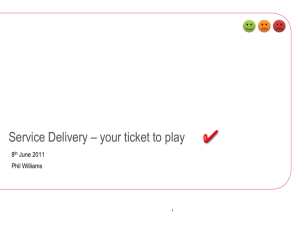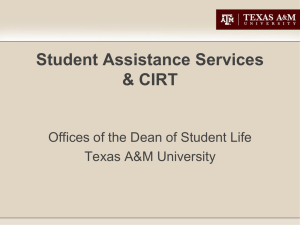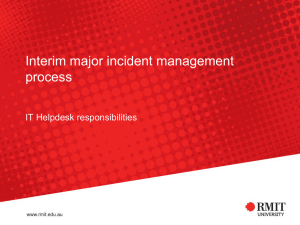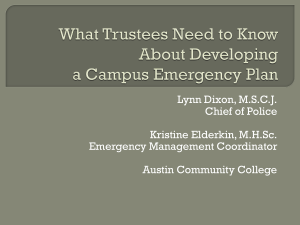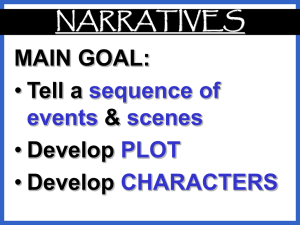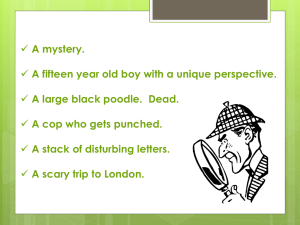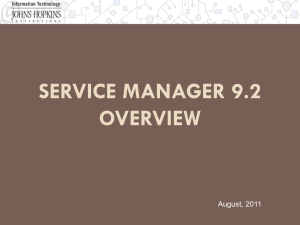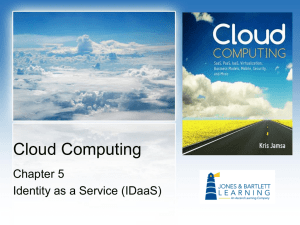Report_Writing_for_the_SSO - National Association of School
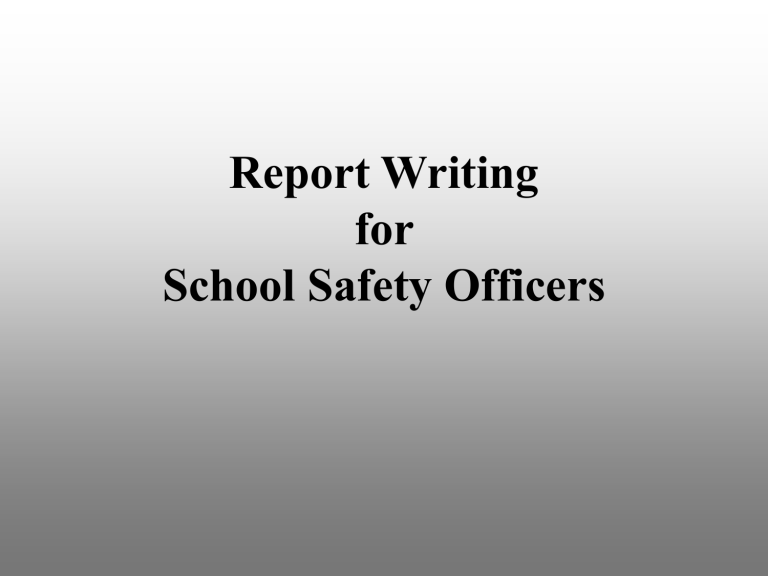
Report Writing for
School Safety Officers
Copyright Warning
The material contained herein is the sole property of the National Association of School Resource Officers Inc. a non-for-profit corporation.
No part of this presentation may be reproduced or utilized in any form or by any means, electronic or mechanical, including photocopying, recording, or by any information storage and retrieval system, without permission in writing from:
NASRO, 14301 FM 315 N. Chandler, Texas 75758
Module Learning Objectives
After completion of this course, you should be able to answer the following questions
• Why is accurate report writing important?
• What’s the best way to gather facts for a report?
• What’s the best way to organize a report?
• What are the essential elements of a good report?
Writing Reports or
Why do I have to spend so much time and energy writing stuff which most of the time doesn’t matter any way ?
Definition of a
School Incident Report:
An orderly written account of the facts of an incident that have been observed, heard or investigated.
Importance of a Well-Written Report
I.
Multiple readings and uses of the report.
II.
Documentation for your actions, judgment and decisions.
Who sees and what uses are there for the reports that SSOs write ?
Multiple Uses of SSO Reports
• Report is used by many different groups.
• Report information is used for many different purposes.
Law Enforcement
Agency
How a school incident report may be used:
• Decisions about further investigation or action.
Judge
How a school incident report may be used:
• Conditions for pre-trial release
• Setting bail
• Sentencing
Prosecutor
How a SSO
Incident report may be used:
Charging
Priority of case
Plea agreements
Ability to proceed based on evidence and report data
Defense Attorney
How a SSO
Incident Report may be used:
Advice for client based on strength of case
Pre-Sentence Investigation
How a SSO
Incident Report may be used:
Seriousness of incident
Lethality factors
Substance abuse treatment
Child/Adult Protective
Services
How a SSO
Incident Report may be used:
Determination if services or protection is needed for the children, elderly or disabled members in household
Jury
How a SSO
Incident Report may be used:
Understanding of the case and evidence
Is the defendant guilty?
Rehabilitation Program
How a SSO
Incident Report may be used:
• Circumstances of a possible abusive incident
• Level of violence, neglect, and past violence
• Substance abuse issues
Court-Ordered Supervision
How a SSO
Incident Report may be used:
What level of supervision is needed?
Victim
How a SSO
Incident Report may be used:
Protection orders
Civil actions
Child custody issues
Advocate
How a SSO
Incident may be used:
• Safety concerns and planning
• Follow-up advocacy
Future
Investigations/Charges/Discipline
How a SSO
Incident Report may be used:
Historical record for future use;
Your agency, other agencies, background investigations
Importance of Documentation
I.
Establishes that a incident occurred and details the specifics of the incident.
II.
Communicates all relevant information for actions taken by SSO, including the reason for the investigation.
Importance of Documentation
(continued)
III.
Serves as a permanent record of
SSO’s observations and actions regarding a particular incident.
IV.
Documents interviews and onscene investigation even if custodial detentions does not occur.
The “7” report writing essentials
1. Who ---------------------(person’s full name, DOB, address, phone #’s, parents’ names, school )
2. What ---------------------
(actions taken / seen / heard)
3. Where --------------( pinpoint locale of incident & people)
4. When --------------------
(give the date and exact time)
5. How -------( list chronologically the events of the incident)
6. Why -------------------(if known / reasons / motives)
7. Action taken ----(what you did or what are you recommending in response to the incident)
WRITING STYLES
Manuscript: e.g., it was a dark and stormy night
Chronological, e.g., begin at the beginning
Introduction
Body
Conclusion
“ Bullet Pointing”
I.
Characteristics of
Well-Written SSO Reports
Factual
II.
Accurate
III.
Objective
IV.
Complete, yet concise and clear
Characteristics of
Well-Written Police Reports
cont.
V.
Includes available supplemental documents/forms
VI.
Includes school behavioral history of violence or other school rules infractions of the offender
VII.
Protects confidentiality of victim’s address when necessary
I.
Report Characteristics:
Factual
Includes exact statements;
II.
Contains excited utterances in quotes;
III.
Demonstrates emotions by describing the demeanor of those present;
Report Characteristics:
Factual
cont.
IV.
Contains facts and items that can be verified through one of your five senses: sight, hearing, touch, taste, and smell
V.
Write everything that is seen and heard
I.
II.
III.
Report Characteristics:
Accurate
Time of dispatch, response, incident recorded as precisely as possible
Document other important points of time during the incident
Correct names, dates of birth, addresses, and identification of all present including children and witnesses
IV.
Report Characteristics:
Accurate
cont.
Measurements included are accurate, serial # of weapons noted, detailed description of weapons included, scene accurately described
V.
Injuries are carefully noted, described and documented
VI.
Include names and titles of others responding to the scene, i.e., emergency medical personnel, volunteer fire department,
Principal , etc.
I.
II.
III.
IV.
Report Characteristics:
Objective
Contains descriptive language, not opinions
DON’T write: She had a scratch on her face.
DO write: She had a four inch horizontal scratch across her left cheek from ear to upper lip.
Contains all accounts of the incident, even if they conflict.
I.
II.
III.
IV.
Report Characteristics:
Complete
Contains who, when, what, where and how in detail;
Explains why, if applicable, in an objective manner;
Uses direct language; and
Advises of arrest, request for warrant, what to next.
All area’s of your report should meet the criteria of the “4” C’s:
1. C ompleteness
(Full names & #’s for all involved)
2. C onciseness
(Leave in the important details, leave out the unnecessary ones! Experience will teach you this how to do this)
3. C learness
(Use simple words & sentences. Use proper grammar, vocabulary & spelling)
4. C orrectness
(Your entire report is accurate & factual)
Keep facts separate from opinions!!
• Facts:
Statements that can be verified.
• Opinion:
One persons point of view.
Taking notes:
• Is the 1 st step in writing a report.
• Allows you the opportunity to gather the information when it is fresh.
• Allows you to get complete information on all persons involved.
• You don’t have to rely on your memory for important
/ critical information.
Preparing to write:
• With all of the information you have gathered you are ready to organize.
- Before writing, take time to think what you want to write.
- Asses your readers needs and try to answer them all.
- Outline your report using the “7” essentials.
Always review your report after you have completed it!
Do you have all the necessary information?
• Date
• Time
• Place
• Participants
• Witnesses
Keep in Mind
• Write the report in such a way so that someone who wasn’t at the scene could read the report and feel as if they had actually responded.
Everything that you write, like everything you say and how you conduct yourself on the job makes a statement about you!
The words that you chose, the way that you put them into sentences and the tone that you use also reflect on you!
Reality Check
What are the two most important lessons you have learned from this component?
NEXT LEARNING MODULE
SSO Role in Dealing With Special EducationKids

